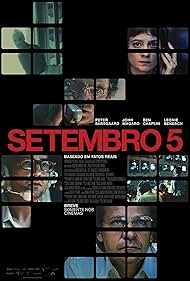During the 1972 Summer Olympics in Munich, Germany, an American sports broadcasting team must adjust to live coverage when Israeli athletes are taken hostage by a terrorist group. Juliette Ménager worked in the casting department for both this film and Munique (2005). Movie Title: September 5 Director: Tim Fehlbaum Writers: Moritz Binder Tim Fehlbaum Alex David Production Companies: BerghausWöbke Filmproduktion, Projected Images, Constantin Film, Edgar Reitz Filmstifung Release Date (USA, Wide): December 13, 2024 Rating⭐ Capone 5⭐This is hard to write about because I’m sure that’s one of the reasons (along with most of them) that it was hard to write and make the film. There’s no getting around the movie Spielberg’s Munich (2005). It’s a story-telling equivalent. In Spielberg’s film, we get a quick summary of the travesty of September 5, 1972, and then we get the full and lengthy aftermath – the search for the perpetrator. In Fehlbaum, we are wrapped in the news of the day – literally, as the film tells the story of the hostage crisis from the perspective of the ABC film crew, who are trying to process it effectively. So, knowing how the movies are connected, I’m going to put the 2005 movie aside and focus on the new movie with a new take on that horrific event. The film deserves its own treatment and respect. The movie has a lot going for it. Reminiscent of 12 Angry Men (1957), September 5th was almost a one-room movie. All of the film’s action takes place at the ABC studios, watching the world from behind a television camera or from the terrace outside the door (for extremely brief moments). Once we get going, the narrative lens never shifts to a long shot of the studio building, the city overpasses, and offers no perspective other than what can be gleaned from and with the crew at the station over the course of a day. at the 1972 Munich Olympics. All of this is located in a few rooms: the control center, the film lab, the captioning room, the playback and film editing room, and maybe one more place in the building. 80% of it probably takes place in that control room. (Even 12 Angry Men has its courtroom scenes.) This choice alone has the effect of placing the audience exactly where the production team sits, from the perspective of what is known and knowable. This heightens the tension – but not as action – as an emotionally effective display of the reality of the circumstances. Combine that with the handheld camerawork and the fact that we don’t hear the other end of the non-broadcast calls into the room, with other directorial and editing options, and you have a very limited scope of what we, the audience, can understand about the world outside the television studio. These decisions had a strong and clear impact on this viewer. The performances were top notch in every way in this movie. I appreciated the scoring, most but not all of the handheld-vs-steadicam choices, and the placement of the camera in relation to the actors and action. These directorial and acting elements gave the script undeniable strength, which itself shone as a powerful and thought-provoking (not just provocative) story. Next: Two complaints. Somehow. "Missed opportunities" call them.One. A little explicitly, we explore the optics and their true collective emotional impact on a country and its people who could not protect Jewish visitors at a time when international camaraderie is the mood of the hour and the opportunity, good" (although Holocaust reparations, as any German or Jew will tell you, are not possible) to the interaction between the former oppressor and the visiting fugitive.



 45/22
45/22